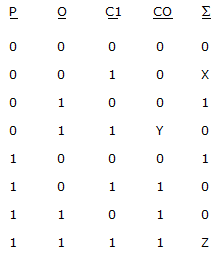Discussion
Home ‣ Digital Electronics ‣ Interfacing to the Analog World See What Others Are Saying!
- Question
What is the speed of the up/down digital-ramp ADC (tracking ADC)?
Options- A. 20 µs
- B. 10 µs
- C. 1 µs
- D. Relatively slow
- Correct Answer
- Relatively slow
- 1. 3428 is the decimal value for which of the following binary-coded decimal (BCD) groupings?
Options- A. 11010001001000
- B. 11010000101000
- C. 011010010000010
- D. 110100001101010 Discuss
- 2. What is one disadvantage of the ripple-carry adder?
Options- A. The interconnections are more complex.
- B. More stages are required to a full adder.
- C. It is slow due to propagation time.
- D. All of the above. Discuss
- 3. If the output of a three-input AND gate must be a logic LOW, what must the condition of the inputs be?
Options- A. All inputs must be LOW.
- B. All inputs must be HIGH.
- C. At least one input must be LOW.
- D. At least one input must be HIGH. Discuss
- 4. A Schmitt trigger has VT+ = 2.0 V and VT? = 1.2 V. What is the hysteresis voltage of the Schmitt trigger?
Options- A. 0.4 volt
- B. 0.6 volt
- C. 0.8 volt
- D. 1.2 volts Discuss
- 5. Write the Boolean expression for an inverter logic gate with input C and output Y.
Options- A. Y = C
- B. Y =
 Discuss
Discuss
- 6. The output of an exclusive-NOR gate is HIGH if ________.
Options- A. the inputs are equal
- B. one input is HIGH, and the other input is LOW
- C. the inputs are unequal
- D. none of the above Discuss
- 7. The truth table for a full adder is shown below. What are the values of X, Y, and Z?

Options- A. X = 0, Y = 1, Z = 1
- B. X = 1, Y = 1, Z = 1
- C. X = 1, Y = 0, Z = 1
- D. X = 0, Y = 0, Z = 1 Discuss
- 8. An input to the mode pin of an arithmetic/logic unit (ALU) determines if the function will be:
Options- A. one's-complemented
- B. arithmetic or logic
- C. positive or negative
- D. with or without carry Discuss
- 9. An informational signal that makes use of binary digits is considered to be:
Options- A. solid state
- B. digital
- C. analog
- D. non-oscillating Discuss
- 10. How can parallel data be taken out of a shift register simultaneously?
Options- A. Use the Q output of the first FF.
- B. Use the Q output of the last FF.
- C. Tie all of the Q outputs together.
- D. Use the Q output of each FF. Discuss
More questions
Correct Answer: 11010000101000
Correct Answer: It is slow due to propagation time.
Correct Answer: At least one input must be LOW.
Correct Answer: 0.8 volt
Correct Answer: Y =

Correct Answer: the inputs are equal
Correct Answer: X = 1, Y = 1, Z = 1
Correct Answer: arithmetic or logic
Correct Answer: digital
Correct Answer: Use the Q output of each FF.
Comments
There are no comments.More in Digital Electronics:
Programming
Copyright ęCuriousTab. All rights reserved.
